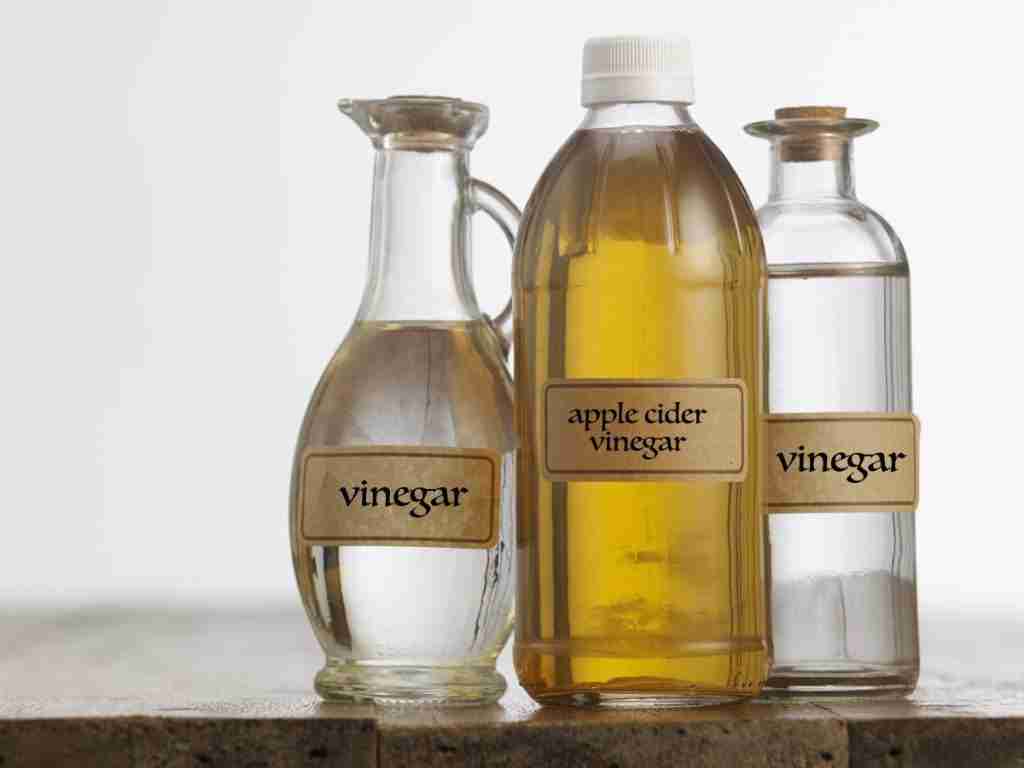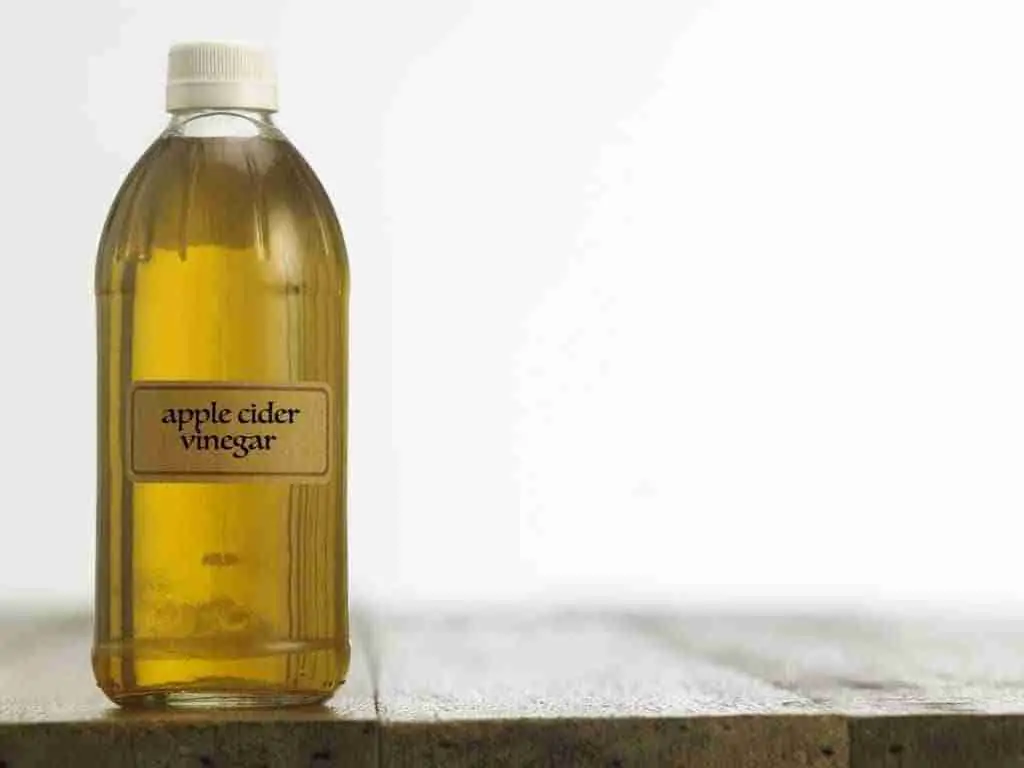
Most people don’t know the real difference between apple cider vinegar and white vinegar. According to Harvard, vinegar has been traced back to 5000 B.C.E. in Babylon, not only for cooking but also as a medicine, a preservative, and a drink to boost strength and promote wellness.
So, what is the real difference between apple cider vinegar and white vinegar? Apple cider vinegar is produced from fermenting apples and their juices. Distilled vinegar, usually called white vinegar (however, not to be confused with white wine vinegar), is made by fermenting alcohol made with grain. As a result, white vinegar is clear in color instead of the slightly fruity flavor and darker apple cider vinegar color.
The word vinegar originates from the French “vin aigre” or sour wine. It plays the role of both a prized cooking ingredient and a household cleaner.
A study showed that vinegar has functional therapeutic properties, including antibacterial activity, blood pressure reduction, antioxidant activity, improving blood glucose response, reduction in the impact of diabetes, and prevention of cardiovascular disease.
Related articles:
- Are You Making These 9 Mistakes: Can I Drink Coffee After Taking Apple Cider Vinegar?
- 24 Disadvantages and Advantages of Apple Cider Vinegar – Backed by Science
What is the real between apple cider vinegar and white vinegar?
Table of Contents
The Real Difference Between Apple Cider Vinegar and White Vinegar
From ancient times, vinegar has been used as a staple in medicine, cooking, and cleaning purposes. One of the most common questions is whether there is any difference between apple cider vinegar and white vinegar.
The most apparent difference between apple cider vinegar and white vinegar is their colors. White vinegar, also called distilled or spirit vinegar, is clear, and apple cider vinegar is brown.
The other difference between apple cider vinegar and white vinegar is that they have different ingredients that alter their flavor and appearance.
Pros Tips:
- Apply apple cider vinegar in the kitchen and white vinegar for cleaning for gardening or around the house.
- Remember that apple cider vinegar and white vinegar are very acidic and should be used or consumed in moderation and always diluted with water.
Check out these 24 Disadvantages and Advantages of Apple Cider Vinegar – Backed by Science.
What Is Apple Cider Vinegar?
Apple cider vinegar originates from apples that have been crushed, distilled, and then fermented. It contains high levels of acetic acid and other compounds responsible for its supposed health benefits (1) For thousands of years, apple cider vinegar has been a natural remedy for health problems for a long time.
Its recommended use are salads, salad dressings, marinades, and sweeter dishes (1)
Before using apple cider vinegar, make sure you aren’t making these 9 Mistakes While Taking Apple Cider Vinegar?

What Is White Vinegar?
White vinegar, also called distilled or spirit vinegar has been a cornerstone in households worldwide for decades. It is produced by fermentation of distilled alcohol, which often originates from fermented grains.
In the past, white vinegar was produced from the fermentation of foods like sugar beets, potatoes, molasses, or milk whey. Habitually, the specific recipe depended on which food item was most readily accessible in a particular country (1)
Nowadays, most white vinegar is produced from the fermentation of grain alcohol (ethanol). This kind of alcohol doesn’t naturally include many nutrients, so other ingredients like yeast or phosphates may be added to kickstart the bacterial fermentation process.
Regular white vinegar is a clear solution, generally including 4–7% acetic acid and 93–96% water (1) which yields a vinegar with an amazingly clean, crisp, strong taste.
Other types of white vinegar can include up to 20% acetic acid; however, these are strictly recommended for agricultural or cleaning purposes and not for human consumption.
White vinegar offers a treasure trove of uses for cleaning, gardening, cooking, and medicinal applications.

Is Apple Cider And Apple Cider Vinegar The Same?
Vinegar is produced worldwide from various starting materials using diverse production methodologies. Acetic acid is the dominant flavor compound in vinegar and is known for its functional therapeutic properties.
White vinegar and Apple Cider Vinegar (ACV) are produced throughout the same process; a distillation of fermented ethanol produces acetic acid, the essential vinegar component.
Apple cider vinegar gives a fresher scent than white vinegar, making it a better choice for cleaning windows, floors, and walls.
White vinegar is most suitable for making dressings and uses as a cleaning agent. Apple cider vinegar is better known for its health benefits and is useful for weight loss and clean skin and hair.
Both Apple cider vinegar and white vinegar are beneficial in their own ways and deserve a place in your kitchen cabinet.
A bottle of distilled vinegar is cheap compared to expensive products made, particularly for cleaning. If you don’t mind the smell, you can simultaneously have sparkling clean toilets and save some money.
Apple Cider Vinegar Vs. White Vinegar Health Benefits
A study showed that vinegar has functional therapeutic properties, including antibacterial activity, blood pressure reduction, antioxidant activity, improving blood glucose response, reduction in the impact of diabetes, and prevention of cardiovascular disease.
Here are the health benefits of apple cider vinegar and white vinegar
Health Benefits of White Vinegar
White vinegar has a stronger and slightly harsher flavor than other drinkable vinegar types, so you probably would not want to consume it alone. However, it can be an efficient ingredient to have on hand as part of a recipe.
White vinegar has many health benefits and has been used medicinally for thousands of years. Most modern research on its health advantages focuses on the acetic acid component of vinegar.
Some Of The Potential Health Benefits Of White Vinegar Include:
- Blood sugar control: Some human studies have observed that ingesting vinegar may decrease blood sugar and insulin levels after a meal.
A study found that vinegar can be useful in decreasing after-meal glucose and insulin levels. Another study concluded that vinegar may improve insulin resistance and metabolic abnormalities.
- Antimicrobial: Because of its antimicrobial qualities, vinegar may be beneficial for healing physical ailments, including nail fungus, warts, and ear infections. It’s also a powerful topical remedy for skin infections and burns.
Researchers observed that vinegar may be a cheap and effective measure to treat skin infections and burns.
- Weight loss: Some researches show that consuming vinegar may increase fullness by slowing the stomach’s empty rate, possibly reducing calorie intake and subsequent weight loss.
A study found that using vinegar as an ingredient can be part of a healthy meal pattern and limit calories, ultimately supporting weight loss and diabetes.
- Gardening applications – You can use white vinegar to kill weeds and help cut flowers stay fresh longer.
Pros Tips:
- A 50/50 ratio of vinegar to water is better for home cleaning projects.
- For weed removal, apply full-strength vinegar.
- Other practical household applications – white vinegar’s antimicrobial properties make it a useful disinfectant and cleaner for many surfaces and appliances. It also is significantly cheaper than other commercially available home cleaning agents.
List Of Items You Can Easily Clean With White Vinegar:
- Countertops
- Coffeemakers
- Showers and bathtubs
- Floors
- Toilets
- Dishes
- Laundry (as stain removal)
- Windows and mirrors
Overall, white vinegar may have significant health benefits because of its acetic acid content, including blood sugar control, weight loss, reduced cholesterol, and antimicrobial properties.
Apple Cider Vinegar Health Benefits
- Appetite suppression and improved satiety: Many researchers have found that vinegar can reduce hunger and improve people’s sense of fullness (1, 2)
This sensation might lead you to eat less without intentionally restricting calories.
A study found that apple cider vinegar helps with weight loss.
In a small trial, individuals ate the same meals on two separate occasions. When they consumed 20 ml (1.3 tablespoons) of vinegar in water before the meal, they took in 200-275 fewer calories for the day than when they drank water before the meal.
- Improved blood sugar control: Studies show that apple cider vinegar may help lower blood sugar levels.
A study of individuals with type 2 diabetes supports that consuming apple cider vinegar with a high-protein, very low-carb snack before bed may enhance fasting blood sugar levels.
- Enhanced insulin sensitivity – In addition to decreasing blood sugar levels, apple cider vinegar may promote and boost insulin sensitivity and reduce post-meal insulin response when consumed with a high-carb meal.
A 2004 study found that individuals with insulin resistance who consumed 20 ml of apple cider vinegar before a high-carb meal showed a 34% increase in insulin sensitivity compared to take a placebo drink before the same meal.
- Useful for women with PCOS (polycystic ovary syndrome): apple cider vinegar may help women with PCOS (polycystic ovary syndrome), an insulin-resistant condition that is the primary cause of infertility.
In a 2013 study, seven women with PCOS ( (polycystic ovary syndrome) took 15 ml (1 tablespoon) of vinegar every day for three months. By the end of the trial, six women felt improved insulin sensitivity, and four resumed ovulating.
- Help for Weight Loss: Apple cider vinegar may help you lose weight.
A 2018 study randomly selected 39 people to follow a restricted-calorie diet with apple cider vinegar or a restricted-calorie diet without apple cider vinegar for 12 weeks. While both groups of people lost weight, the apple cider vinegar group lost more.
Can I Use Apple Cider Vinegar Instead of White Vinegar?
Yes, as long as it is 5% (some wines’ vinegar aren’t), it will change the flavor and sometimes the end product’s color. According to a National Center for Home Food Preservation study, various vinegar types may be used; however, not all give the same results.
On the one hand, distilled white vinegar is clear in color and has a sharp, acidic taste. It is the best option for delicately flavored herbs. On the other hand, apple cider vinegar has a milder flavor than distilled white vinegar, but the amber color may not be desirable. Apple cider vinegar mixes best with fruits.
Overall, Apple cider vinegar is less acidic, and I would say more flavorful than white vinegar, which is about 7% acidic.
White vinegar tends to elevate the complex flavors in any delicate-tasting product.
Apple cider vinegar is often used for dressings and marinades, while white vinegar is used in pickling and cleaning solutions. However, using apple cider vinegar for cleaning is possible because its color is not as expected.
Both Apple cider vinegar and white vinegar are generally used as antibacterial agents, digestive aid, appetite suppressants, and cough treatments.
Final Thoughts
Overall the difference between apple cider vinegar and white vinegar is minimal.
- White vinegar and Apple Cider Vinegar (ACV) are produced throughout the same process; a distillation of fermented ethanol produces acetic acid, the essential vinegar component.
- Both Apple cider and white vinegar are beneficial in their own ways and deserve a place in your kitchen cabinet.
- White vinegar is most suitable for making dressings and uses as a cleaning agent.
- Apple cider vinegar is better known for its health benefits and is useful for weight loss and clean skin and hair.
Now that you know the difference between apple cider vinegar and white vinegar. What is another difference between apple cider vinegar and white vinegar do you know of and would like to add?

